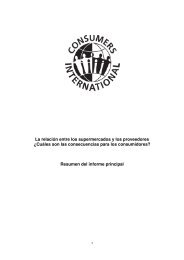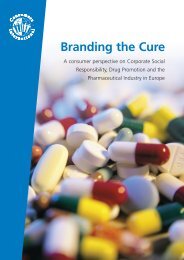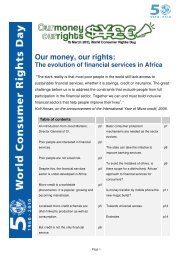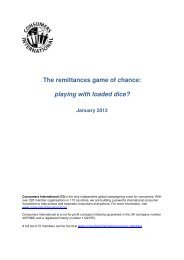Voices for Change: the Consumer Right to Representation
Voices for Change: the Consumer Right to Representation
Voices for Change: the Consumer Right to Representation
Create successful ePaper yourself
Turn your PDF publications into a flip-book with our unique Google optimized e-Paper software.
World <strong>Consumer</strong> <strong>Right</strong>s Day 2002: <strong>Voices</strong> <strong>for</strong> <strong>Change</strong><br />
Examples from Asia<br />
<strong>Consumer</strong> associations in Asia have made<br />
major strides in being recognised as<br />
legitimate representatives of <strong>the</strong> consumer<br />
interest. They have been legitimised by<br />
statute, given standing be<strong>for</strong>e <strong>the</strong> courts and<br />
o<strong>the</strong>r redress agencies <strong>to</strong> represent <strong>the</strong><br />
consumer interest, and have been provided<br />
membership in consumer policy-making<br />
agencies. They participate in industrymaintained<br />
alternative dispute resolution<br />
mechanisms and even negotiate codes and<br />
charters on <strong>the</strong>ir own initiative.<br />
<strong>Representation</strong> provided<br />
by statute<br />
Many Asian countries <strong>to</strong>day have statutes<br />
styled as <strong>Consumer</strong> Protection Codes/Acts.<br />
The first of <strong>the</strong>se was introduced by Japan in<br />
1968. Three features found in some of <strong>the</strong>se<br />
statutes enhance <strong>the</strong> representative role of<br />
consumer associations:<br />
• They provide <strong>for</strong> <strong>the</strong> establishment of<br />
consumer organisations and specify that <strong>the</strong><br />
legitimate function of <strong>the</strong>se organisations is<br />
<strong>to</strong> represent <strong>the</strong> consumer interest. Codes<br />
define consumer organisations and specify<br />
<strong>the</strong>ir functions. Some also provide <strong>for</strong> <strong>the</strong><br />
granting of a subsidy.<br />
• <strong>Consumer</strong> protection statutes generally<br />
provide consumer organisations with <strong>the</strong><br />
required “standing” <strong>to</strong> initiate actions on<br />
behalf of individual consumers or class of<br />
consumers in <strong>the</strong> courts or in specially<br />
created alternative redress mechanisms.<br />
Theses statutes provide consumer<br />
associations a privileged status by<br />
permitting <strong>the</strong>m <strong>to</strong> bring public interest<br />
litigation, or even substituted actions on<br />
behalf of a consumer.<br />
• <strong>Consumer</strong> protection statutes establish<br />
consultative councils and specifically<br />
provide <strong>for</strong> representation in <strong>the</strong>m of <strong>the</strong><br />
consumer interest by representatives of<br />
consumer associations. These consultative or<br />
advisory councils also have representatives<br />
from government agencies and industry.<br />
<strong>Representation</strong> in government and<br />
industry consultative mechanisms<br />
<strong>Consumer</strong> organisations represent <strong>the</strong><br />
consumer interest in a number of national,<br />
state and district level government<br />
committees focusing on specific areas of<br />
policy <strong>for</strong>mulation, standards or<br />
programme implementation. The Federation<br />
of Malaysian <strong>Consumer</strong> Associations<br />
(FOMCA) <strong>for</strong> instance, is a member of no<br />
less than 40 government committees.<br />
<strong>Consumer</strong> associations participate in nongovernmental<br />
and industry networks that<br />
focus on a variety of subject areas<br />
(environment, <strong>to</strong>urism, child welfare, etc.)<br />
<strong>Representation</strong> in industry-funded<br />
mediation schemes<br />
Industry-funded mediation services (such<br />
as Malaysia’s insurance and banking<br />
mediation boards, modelled after <strong>the</strong> UK’s<br />
Ombudsman Bureau) act as an independent<br />
arbitra<strong>to</strong>r in cases referred by consumers.<br />
The media<strong>to</strong>r is empowered <strong>to</strong> make<br />
awards of up <strong>to</strong> a specified maximum that<br />
is binding on <strong>the</strong> insurance company or<br />
bank concerned but not <strong>the</strong> consumer. The<br />
consumer is free <strong>to</strong> reject <strong>the</strong> award and<br />
exercise <strong>the</strong>ir legal rights.<br />
<strong>Representation</strong> by <strong>the</strong> initiative of<br />
consumer groups<br />
<strong>Consumer</strong> groups in many countries have<br />
initiated standard-setting charters detailing<br />
<strong>the</strong> rights of consumers. In India, <strong>for</strong><br />
example, over 100 Citizen Charters have<br />
been enacted and announced by a special<br />
department of <strong>the</strong> Prime Minister’s<br />
Secretariat. While charters, codes and<br />
o<strong>the</strong>r “soft law” options <strong>to</strong> government<br />
regulation are not effective in all situations,<br />
<strong>the</strong>y are certainly a measure of <strong>the</strong> stature<br />
of consumer associations in obtaining <strong>the</strong><br />
agreement of <strong>the</strong> associations of<br />
professionals in those fields. However, <strong>the</strong><br />
effectiveness of <strong>the</strong>se schemes must be<br />
viewed in <strong>the</strong> context of <strong>the</strong> bargaining<br />
process and quality of representation<br />
involved.<br />
– Dr Sothi Rachagan<br />
21






![pkef]Qmf eg]sf] s] xf] < - Consumers International](https://img.yumpu.com/6479658/1/184x260/pkefqmf-egsf-s-xf-consumers-international.jpg?quality=85)
